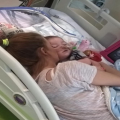Podcast: Play in new window | Download
Subscribe: Apple Podcasts | RSS
Hi, it’s Patrik Hutzel from INTENSIVECAREHOTLINE.COM where we instantly improve the lives for Families of critically ill Patients in Intensive Care, so that you can make informed decisions, have PEACE OF MIND, real power, real control and so that you can influence decision making fast, even if you’re not a doctor or a nurse in Intensive Care!
This is another episode of “YOUR QUESTIONS ANSWERED“ and in last week’s episode I answered another question from our readers and the question was
You can check out last week’s question by clicking on the link here.
In this week’s episode of “YOUR QUESTIONS ANSWERED” I want to answer questions from one of my clients Eva as part of my 1:1 consulting and advocacy service! Eva’s husband had cardiac bypass surgery, developed a stroke in the ICU and Eva is seeing positive signs that her husband gets better, and Eva is asking why they can’t give her more time in ICU.
My Critically Ill Husband is on Dialysis and in the ICU due to Septic Shock. Why is the ICU Team in Such a Hurry?

Patrik: And he’s still around. He’s an amazing gentleman. I will send you that interview when we come off this call. Now, it is so important to have perspective. So important. They aren’t going to tell you about the people who survived, they are just painting this doom and gloom picture.
Eva: Right.
Patrik: Here is another, and I don’t know how much research you have done on our website. Here is another important number that I believe that people need to be aware of. About 90 percent of patients in intensive care survive. So the question needs to be raised why would your husband be in the minority?
Recommended:
Eva: Right.
Patrik: Right. Patients go into intensive care for a reason. And they go in there because they are very sick. You know a lot of patients are as careful as they can ever be. However, medicine has gone a long way. Right. And people do survive.
Eva: It seems to be around that they can’t wean him off the life support blood pressure drugs.
Patrik: Correct.
Eva: And then my question has been well I don’t understand why people aren’t there no other drugs that can help to keep blood pressure elevated. Besides intravenous?
Patrik: No. No. There is, but it’s very. It’s by no means as efficient as dopamine, dobutamine, or norepinephrine by a doctor. I tell you what needs to happen for your husband to get off the dobutamine and norepinephrine, you know and he might be on epinephrine as well. I tell you what needs to happen a number of things. Number one, he needs to come off the dialysis, okay?
Eva: Yeah.
Patrik: Number two, his ejection fraction probably would have to improve. Right. Yes, they are some medications that he could potentially take orally that would strengthen the contractility of the heart, right?
Eva: Yeah. Yeah.
Patrik: He might potentially benefit from a few more days of ECMO. He might. Just to give the heart a bit of a rest,right?
Eva: Right.
Patrik: And that’s also asking where is the cardiologist in all of this? The cardiac surgeons job is done but where is the cardiologist in all of this.
Eva: Ah, okay.
Patrik: I want to hear what the cardiologist has to say.
Eva: Okay.
Patrik: Is the cardiologist in the picture?
Eva: I haven’t seen a cardiologist. We have had internal medicine. I don’t. Not that I have been involved with.
Recommended:
Patrik: Okay. Okay. The other thing. Do you know whether… you know what his urea and creatinine are? Do you know what I mean by that?
Eva: There. Yeah. I believe the last number I heard was the creatinine was 112 and it’s been coming down. The urea they haven’t really talked about it so I guess it’s not bad. One of the numbers that they are worried about is the lactate and it continues to go down and come up. It’s around 2.1. His white blood cell count is still a little bit elevated. But there has been some various theories on that.
Patrik: It sounds like urea and creatinine might be back to normal but that doesn’t mean that the kidneys have kicked back in. You know for the kidneys to kick back in the urea and creatinine should be back to normal but again it comes back to the MAP.
Eva: Yup, okay.
Patrik: Right.
Eva: So that’s a good question to ask.
Patrik: Absolutely. And the other thing I am definitely concerned if the lactate is going up then there could be two reasons for lactate going up. Number one could be the infection. Okay and number two could be the heart failing. Both can contribute to a high lactate. I would imagine it’s mainly the infection. But you can’t rule out that part of the rising lactate is the heart failure. Here is what is important to know Eva as well. With all this talk of end of life and doom and gloom and what not. They have to follow policies and procedures. They can’t just say to you or your husband, oh yeah tomorrow we are going to stop life support, okay?
Eva: Okay.
Patrik: So they have to follow policies and procedures. Which means, it’s important to understand their not operating in a vacuum. What do I mean by that? A lot of families come to us and they say, hey we were told that tomorrow by 12:00 they are going to stop life support for my husband, my dad, my mom, you know whatever the case may be. And they often say this matter of fact, as if families have no choice. Well of course families have choice.
Eva: Okay.
Patrik: I mean it is life or death.
Eva: Yeah.
Patrik: Right. They are not operating in a vacuum. What I mean by that is they have to adhere to policies and procedures as well as laws. So if they for example withdrew life support on a patient tomorrow and the family objects, the family has every right to object.
Eva: Okay.
Recommended:
Patrik: Right. So yes they can talk to you and your husband about end of life potentially but you know, they aren’t operating in a vacuum. There would be –
Eva: My fear is…they kind of-
Patrik: Yeah.
Eva: It’s pretty hard to tell.
Patrik: No, no.
Eva: So they could just turn it off when I’m outside of the room.
Patrik: Sure. Sure. But what I am telling you is with the way things are I wouldn’t be surprised if they tell you tomorrow, ah yeah on Friday or on Saturday we stop life support, I wouldn’t be surprised if that’s where they were leading up to. And then it’s important to be prepared.
Eva: Okay.
Patrik: I can also tell you I would like one of their next steps would be to say to you, hey we have to sit down and we have to have a meeting, okay? And it sounds to me like you have been part of the round and what not and maybe that’s the way it’s being managed there but most of the times in situations like that the families are being asked to sit down and have a meeting. Now-
Eva: Right. Yeah.
Recommended:
Patrik: When that happens I would recommend the following steps, I would say to them “look, if you want to have a meeting give me the meeting agenda in writing and then I’ll have to think about attending or not”.
Eva: Okay.
Patrik: Because I can tell you what often happens families are being asked –
Eva: To get in there. Yeah.
Patrik: We have to have a meeting, it all sounds urgent and what not. We have to have a meeting. Families don’t get told what the meeting is all about. And nine times out of ten –
Eva: Yeah.
Patrik: It’s having another end of life talk. Right. And your response to a request for a meeting needs to be “give me the meeting agenda in writing and I’ll think about whether I attend or not”.
Eva: Okay.
Patrik: It’s so important to manage the dynamics because they are used to basically dictate people the terms.
Eva: Yeah.
Recommended:
Patrik: Right and you need to be prepared for whatever comes your way, in terms of how you react and I would also if I was you… What do you want? At the end of the day you want the best treatment options for your husband being available and that’s actually all you need to say. It’s very important going forward that you are consistent in your requests.
Eva: Okay.
Patrik: And it sounds to me like you have been already, but you don’t need to go overboard in talking to them. You just need to make sure-
Eva: Okay.
Patrik: Well that’s what I want for my husband and if they keep coming to end of life then you just keep saying well that’s not what we want, you and your husband. You know you just say –
Eva: Yeah.
Patrik: That in no uncertain terms what I want and if they keep on about end of life then you can come in with the argument about hospital policies about end of life about there would be a state law in Australia about end of life right?
Eva: Right.
Patrik: And especially about the decision making process. Most states in Canada as well as the US and other countries they need to be consent from either a patient or a medical power of attorney when it comes to the removal of life support.
Eva: Yes.
Patrik: Right. So and that’s why I keep saying yes-
Eva: So I think, and that’s where I had this discussion actually with our quality care person, when they went in to give my husband an IV, to start an IV and I’m his alternative decision maker. He’s had a stroke, he’s only been awake for a couple of weeks, and he doesn’t have a lot. It’s very difficult for him to make his wishes known and he’s very scared of hospitals. So we went in, they waited until I left and went in and asked him if they could start this IV and he of course said no. So I said either I am making the decisions on this or not, it can’t be one time I am making it and the next time you go and let him make those decisions. And she was a little bit shocked. I said so until you tell me that, that decision making power. I have signed for is now handed over to him, I am that decision maker. So, I think they could bully him into saying stop.
Recommended:
Patrik: They could. They could and that’s why it’s so important that you are there when those discussions happen. And the other thing is when you are there with your husband, you could say in combination with your husband to them, look we are sick of this, we don’t want to talk about it anymore, we want you to continue treatment, you know. And that’s why it is very important that you are very consistent with saying what you want. You know there is no ambiguity. Remove ambiguity.
Eva: Okay. So how do I go and tell them I don’t like their treatment plan.
Patrik: Number one,
Eva: Like how –
Patrik: Number one tell them, right? Number two ask them where the cardiologist is.
Eva: Okay.
Patrik: Number three the cardiac surgeon, is he still in the picture?
Eva: I haven’t seen him.
Patrik: Okay, what did he do? He would have done a bypass, he would have done bypass surgery.
Eva: He did.
Patrik: How many bypasses?
Eva: Five.
Patrik: Five. And who made the decision for ECMO?
Eva: He did.
Recommended:
Patrik: The cardiac surgeon?
Eva: Yes.
Patrik: And that was before or after surgery or both?
Eva: I believe they used it for surgery and then because his lungs had filled up with fluid they could not take him off of it at that time.
Patrik: Yeah, sure, sure, sure. So number one you need to be very consistent in your requests right? Which you may have already been. Would you say you have been sort of persistent with you request or have not?
Eva: I haven’t actually made any requests.
Patrik: You haven’t made any requests. That’s okay. That’s okay. Well going forward you will. Going forward you will.
Eva: The request side have been less about treatment and more just about care.
Patrik: Sure, sure.
Eva: Just about quality of care because he has sent a lot of time in the ICU.
Patrik: When you say quality of care, would you fault for example the nursing care would you fault that, or would you say the care-
Eva: Not, not, not. More things about, he comes in with some other severe anxiety about hospitals and doctors.
Patrik: Sure. Sure.
Eva: He’s blind in one eye. He had AION (Anterior Ischemic Optical Neuropathy) in the other eye so his vision is a bit limited. Just about things like that. In terms of how to relate with him a little bit better especially when he was not able to communicate at all and he had no way to interact with people.
Patrik: Okay. Okay. How can you go about besides you verbalising what you want, that’s one thing. The other thing that I am doing and I’m doing my best with a quick look online in terms of what Australia says for end of life decision making. I haven’t found anything yet, but I will find something. As I said most states in the US and Canada clearly state that end of life decision cannot be made without patient or family consent, right? But I’m trying to find the evidence.
Recommended:
- My 47 Year Old Sister Is In ICU With Pneumonia And The Intensive Care Team Wants To “Pull The Plug”!
Eva: Well, I don’t want it patient or family. It should be with the appointed decision maker.
Patrik: Yes with consent of the appointed decision maker. Yes, exactly. With consent of the appointed decision maker.
Eva: And I don’t know how they can say he’s so sick and then say he can make his own decisions.
Patrik: Yes.
Eva: It’s like its one or the other.
Patrik: That’s right. That’s right.
There’s no advanced care directive? Do you know what I mean by that?
Eva: No, no.
Patrik: Is there an advanced care directive or –
Eva: No there is none.
Patrik: That’s okay. Let’s just very quickly look at the worst case scenario. Let’s just say your husband, cardiac arrest and his heart stopped and they would have to resuscitate him. Have you heard of the term DNR?
Eva: A do no resuscitate?
Patrik: Yes, yes.
Eva: So what he has is a no CPR. That is what we agreed upon. He had already been through CPR once for once a mistake and when he had just, that was what I had said. So you can do the shock, they have done the bagging. I think, my feeling and I guess that’s a discussion I need to have with him is that if his heart stops again do we actually want to start it again.
Patrik: And when… But it sounds like you have made the decision that there is a DNR.
Recommended:
Eva: No, it’s not a DNR. Because they did resuscitate him. He coded when he was coming from the ward down here. I don’t know the level of what it was. When I got there he was just being hand ventilated and but definitely flat lined.
Patrik: Okay.
Eva: With that being said, that happened to him previously and what he had was a vasovagal episode.
Patrik: Are you confident that there is no DNR in place?
Eva: I don’t know that. How would I know that?
Patrik: Number one have you or your husband had the discussion with the doctors around that.
Eva: No one has ever had that discussion with me. I think that was his discussion today actually. Because I was talking with the spiritual care advisor and I said I have had no discussions about any of this. No one has come to me to talk about any of these kind of decisions about being about-
Patrik: And the time-
Eva: I didn’t plan for it to be in front of my husband on the day that he actually… I just wanted some time with him. I didn’t really want that day to be… it didn’t have to be that day. I don’t know why they are in such a hurry.
Patrik: Well, because of money. Because of money and because of space. Which is the equivalent for them to money. There is a very good website. And I have just had a look there and it says there in Australia, a DNR or end of life cannot be made without family consent or patient consent.
Eva: Okay.
Patrik: It really comes down to if any patient is in a bed and can make their own decisions and somebody says we aren’t going to resuscitate you. It’s just inhumane. It’s cruel.
Eva: Yes, yeah.
Patrik: People have a life.
Eva: Yes, so I don’t think that is their –
Patrik: Well, well, well.
Eva: So I guess I need to check that, I will talk –
Patrik: You need to check that.
Recommended:
Eva: I will talk with the people tomorrow. I actually Patrik, I have to get some sleep.
Patrik: No, no.
Eva: No, but three in the morning for me.
Patrik: Why don’t you call me back when you are ready? What I will do is-
Eva: Yeah.
Patrik: I will send you an email, I will quickly summarise what we talked about and-
Eva: Yes please.
Patrik: I’ll put a few questions in there that you can ask them. I will also send you a link to the interview that I have had with this wonderful gentleman in Boston. Because it puts things in perspective.
Eva: Yeah, yeah. It has been a very interesting journey. And that going into this I was very upset that they actually did the surgery, put him on ECMO, they didn’t ask for any consent from me, I knew nothing about it. I was sitting in a waiting room for nine hours with no one telling me anything, and I really thought that he would not have wanted to go through that. But interestingly enough. He has fought every step of the way. He has endured every single intervention with stoicism and cooperation and totally believed that he was getting better.
Patrik: Now that’s good.
Eva: He knows his body –
Recommended:
Patrik: Yes.
Eva: Better than anybody else.
Patrik: Of course.
Eva: I can’t imagine what a blow that this has been today.
Patrik: Yeah. Yeah. What is your plan for tomorrow? What time are you going to the hospital?
Eva: I’m sleeping at the hospital so I generally try to get in before they try to kick me out.
Patrik: Are you in the hospital at the moment?
Eva: I am. Yes.
Patrik: Oh my goodness. You definitely need to get some sleep.
Eva: Yes, yeah I do. I don’t know how they think you can sleep when someone comes in and I did leave his room when I kind of startled awake and probably woke him up. I did make a choice that some sleep in the waiting room would be a good idea. I might go in and check on him one more time.
Patrik: Right.
Eva: Just to make sure that everything is alright.
Patrik: Yeah. Okay. Okay. Look you –
Eva: I think. Okay. Do you sleep?
Patrik: No I’m not asleep. I’m in a different time zone.
Eva: No, no, no. When do you sleep? Yeah, you are in a different time zone, so in the morning when do you sleep?
Patrik: I do sleep however with my business I do have nights where I am awake but like everybody else I do need to sleep.
Recommended:
Eva: Yeah, me too. I think for me I’m going to ask the questions where is the cardiologist to help with this, and also nephrology has kind of said not much we can do but with the fact that the creatinine. They didn’t say that, they said continue on the plan, which I guess is the CRT but why can we not keep him at 65, a little higher MAP for a while and try to get him off the CRT.
Patrik: Absolutely.
Eva: Okay. I think they are going around this backwards. And they need to explain to me why they cannot do this.
Patrik: It concerns me they are aiming for a 55 and not a 65 which concerns me.
Eva: I’m guessing they are going to say because his heart is so weak.
Patrik: Uh, yeah.
Eva: But he’s sitting at 65 a lot of the times.
Patrik: Yeah, yeah.
Eva: Well that’s what they have said but he’s doing okay at 65 so the last ultrasound his heart. Okay good is probably a very subjective term but compared to where he was last week it has recovered a lot.
Patrik: How often do they do the ultrasound of the heart?
Eva: Every couple of days maybe.
Patrik: No, no that’s good. I’m glad they are doing all of that. It’s important that they keep doing all of that.
Eva: Sure, and it is a teaching hospital. It’s pretty hard to say now we aren’t going to do anything more.
Patrik: Well, between the lines they have already told you that, between the lines.
Eva: Yeah, yeah.
Patrik: Okay, you let me know when you want to talk. I will quickly summarise-
Recommended:
Eva: Okay.
Patrik: What we have spoken about. I will email you some questions for when you are ready to ask those questions and then you let me know when you want to get on the phone next.
Eva: Okay that sounds good. Thank you very much. I appreciate it.
Patrik: Thank you very much. Bye bye for now.
Eva: Okay, okay. Bye bye.
The 1:1 consulting session will continue in next week’s episode.
How can you become the best advocate for your critically ill loved one, make informed decisions, get peace of mind, control, power and influence quickly, whilst your loved one is critically ill in Intensive Care?
You get to that all important feeling of making informed decisions, get PEACE OF MIND, CONTROL, POWER AND INFLUENCE when you download your FREE “INSTANT IMPACT” report NOW by entering your email below!
In Your FREE “INSTANT IMPACT” report you’ll learn quickly how to make informed decisions, get PEACE OF MIND, real power and real control and how you can influence decision making fast, whilst your loved one is critically ill in Intensive Care! Your FREE “INSTANT IMPACT” Report gives you in-depth insight that you must know whilst your loved one is critically ill or is even dying in Intensive Care!
Sign up and download your FREE “INSTANT IMPACT” REPORT now by entering your email below! In your FREE “INSTANT IMPACT” REPORT you’ll learn how to speak the “secret” Intensive Care language so that the doctors and the nurses know straight away that you are an insider and that you know and understand what’s really happening in Intensive Care! In your FREE report you’ll also discover
- How to ask the doctors and the nurses the right questions
- Discover the many competing interests in Intensive Care and how your critically ill loved one’s treatment may depend on those competing interests
- How to eliminate fear, frustration, stress, struggle and vulnerability even if your loved one is dying
- 5 mind blowing tips & strategies helping you to get on the right path to making informed decisions, get PEACE OF MIND, control, power and influence in your situation
- You’ll get real world examples that you can easily adapt to your and your critically ill loved one’s situation
- How to stop being intimidated by the Intensive Care team and how you will be seen as equals
- You’ll get crucial ‘behind the scenes’ insight so that you know and understand what is really happening in Intensive Care
- How you need to manage doctors and nurses in Intensive Care (it’s not what you think)
Thank you for tuning into this week’s YOUR QUESTIONS ANSWERED episode and I’ll see you again in another update next week!
Make sure you also check out our “blog” section for more tips and strategies or send me an email to [email protected] with your questions!
Also, have a look at our membership site INTENSIVECARESUPPORT.ORG for families of critically ill Patients in Intensive Care here.
Or you can call us! Find phone numbers on our contact tab.
Also check out our Ebook section where you get more Ebooks, Videos and Audio recordings and where you can also get 1:1 counselling/consulting with me via Skype, over the phone or via email by clicking on the products tab!
This is Patrik Hutzel from INTENSIVECAREHOTLINE.COM and I’ll see you again next week with another update!







